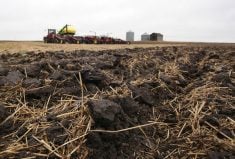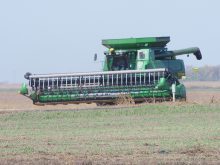Amendments would exempt propane, natural gas from carbon pricing if used to heat farm buildings or dry grain
Amendments to the federal greenhouse gas pollution pricing legislation are heading back to the House of Commons after they were passed at the standing agriculture committee.
Farm organizations urged parliamentarians to adopt the legislation.
The all-party committee studied Bill C-234, a private member’s bill sponsored by Ontario Conservative MP Ben Lobb, and amended it to include a sunset clause of eight years.
By then, committee members hope, cleaner technology will exist to allow farmers to dry grain and heat farm buildings more sustainably.
Read Also

Manitoba extends Crown land rent freeze
Manitoba government links the continued rental rate freeze on grazing and forage leases to economic and environmental challenges facing the industry
If passed in Parliament, the bill will exempt propane and natural gas used for those purposes from carbon pricing.
The omission of those fuels from the Greenhouse Gas Pollution Pricing Act came to the fore during the extremely wet fall of 2019 when much of the prairie harvest had to be dried.
A similar bill was passed in the previous Parliament but didn’t make it through the Senate before an election was called.
Liberal committee members did not support the final version of the bill, but it passed with the support of the Conservative, NDP and Bloc Quebecois members.
Ryan Turnbull, who represents Whitby, had moved to make barn heating ineligible for the exemption.
He said testimony to the committee indicated there weren’t commercially viable solutions for grain drying other than natural gas or propane but there were some for heating and cooling of barns and greenhouses.
“We also know one thing that farmers can do is insulate their barns,” he said. “It is a possibility for reducing their carbon footprint.”
His motion was defeated.
However, the committee unanimously agreed on an amendment from British Columbia-based NDP agriculture critic Alistair MacGregor to better define which buildings were included in the exemption as those for “raising or housing of livestock or for the growing of crops.”
He also said that he had previously worked in construction of a large commercial greenhouse, and facilities like that use large gas-fired boilers.
“We do want to see them transition, but these are systems worth millions of dollars. It’s not something that can happen overnight.”
Conservative agriculture critic John Barlow, from Alberta’s Foothills riding, proposed a 10-year sunset clause so that there was still a signal for producers to invest in new technology. Witnesses during testimony had agreed a sunset clause would make sense.
“It would be an incentive for when the time comes when new technology is commercially as well as economically and regionally available, that we know our farmers are always going to embrace new innovation and new technology that makes it more economically and environmentally sustainable,” he said.
The amendment included provision for an order-in-council so that the sunset clause could be debated within the House of Commons.
Liberal members worried about continual renewal of the exemption and moved an eight-year sunset clause. The rationale was the fact that the previous bill had included a 10-year exemption and two years had since passed.
The Conservatives and others agreed to eight years.
Grain Growers of Canada and members of the Agriculture Carbon Alliance commended the committee for its work.
“With the threat of global food insecurity looming, we must champion food security, affordability and accessibility,” said GGC chair Andre Harpe. “Canadian farmers need practical on-farm policy that aligns sustainability and competitiveness. It’s encouraging to see support come from across party lines, but now is the time for all parties to come together and support Bill C-234.”
He said the exemption allows farmers money to invest in new technologies and practices that reduce emissions.
Dave Carey, co-chair of the ACA, said Canada must prioritize production of high-quality sustainable food.
“We need to do all we can to safeguard our food security, and with the cross-party support seen at the committee stage, we are hopeful the bill will receive broader support at third reading,” he said.
Co-chair Scott Ross said tacking a carbon price on to essential farming activities doesn’t send an adequate signal to lower emissions but takes away working capital.
“Farmers are climate solution providers so let’s enable them to unleash their full potential,” he said.
















